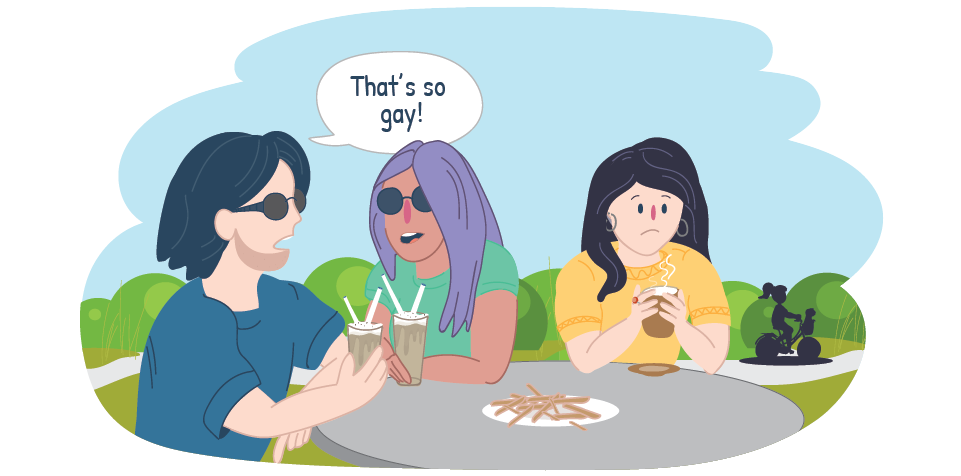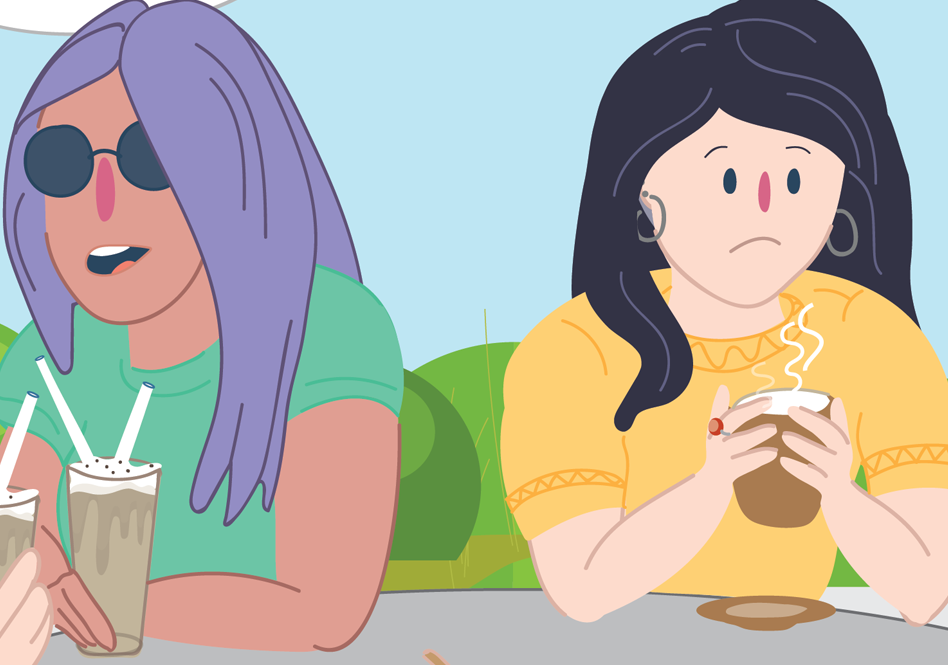Sexual, gender and bodily diversity discrimination
Many LGBTIQA+ people face discrimination and prejudice that can affect their health, wellbeing, rights and opportunities. Learn more below.

This article was written and reviewed by people in the LGBTIQA+ communities.
Discrimination and its impact on mental wellbeing
With growing acceptance and recognition in society, most LGBTIQA+ people have good mental health. However, many others experience discrimination that can have a big impact on their health and wellbeing.
- Discrimination is the unfair treatment of people because of personal qualities like their age, ethnicity, sex characteristics, gender and sexuality.
- Information on intersex people shows high rates of discrimination, harm and abuse.
- Compared to heterosexual people nearly twice as many non-heterosexual people face discrimination and abuse from others (e.g. emotional, verbal, physical, sexual) because of their sexuality.
- Rates of discrimination and abuse are even higher among gender-questioning and transgender people.
- Fear of discrimination and abuse leads to many people hiding their sexual or gender identity and information about their bodies.
- Discrimination, exclusion, prejudice, harm and abuse are some of the main reasons that LGBTQIA+ people struggle with depression, anxiety, substance abuse and self-harm. They are three times more likely to experience depression compared to the rest of the population.
- For 80% of young LGBTIQA+ people, discrimination and bullying happens within their school and has a huge effect on their wellbeing and education
Hetero-cisnormativity and Hetero-cissexism
Learn more about why the LGBTIQA+ community experiences discrimination.
Heterosexism is a form of discrimination that views heterosexuality as the norm and superior to other sexual/romantic identities. Cissexism is a form of discrimination based on cisnormativity where trans, gender diverse and non-binary identifying are treated as lesser than cisgender people.
In society, hetero- and cisnormativity pressures people to fit binary gender and heterosexual roles, while stigmatising any other behaviours, identities, relationships, communities and/or experiences. Because of this, hetero- and cisnormativity is related to heterosexism, cissexism, homophobia, biphobia and transphobia.
Cisnormativity is the expectation that sex assigned at birth matches gender where the only options are binary (male or female). People with hetero-cissexist attitudes and beliefs view the LGBTIQA+ community as second-class minorities, which leads to discrimination of their legal rights, civil rights and socio-economic opportunities.
Examples of heterosexism and cissexism in Australia, and its recent history, has included: restricting who can marry; forcing already married couples to divorce (e.g. ‘forced divorce laws’); not recognising gender variations for legal documents; laws that discriminate against non-heterosexual and gender diverse people (e.g. ‘gay panic defence’), and; media stereotyping.
Heteronormativity is the expectation that heterosexuality is favoured and assumed to be the norm in society. Heteronormative attitudes and beliefs include believing that relationships are only morally acceptable when they are between people of the opposite sex.
Stigmatisation and discrimination against intersex people
People with intersex variations face many of the same problems that LGBTQA+ people do, but in different ways.
- One of the most concerning is forced and coercive medical practices that aim to make the bodies of intersex people appear more “typically” female or male.
- These practices are based on ideas that people need particular kinds of bodies to be “normal” or to prevent bullying and stigmatisation. They are also based on ideas that people with one kind of body will grow up to have one kind of identity.
- There is no firm evidence that surgery can prevent bullying or stigmatisation, and nor can it make “normal” bodies. People with all kinds of bodies grow up to have all different kinds of identities.
What is Homophobia, Biphobia and Transphobia?
There are several common terms to describe the fear, hatred, discomfort or mistrust people experience toward people in LGBTIQA+ communities:
Homophobia: Discrimination and prejudice towards people who identify as Gay, Lesbian or Homoromantic Asexual.
Biphobia: Discrimination and prejudice towards people who identify as Bisexual or Pansexual.
Transphobia: Discrimination and prejudice towards people who are transgender, genderqueer or don’t follow traditional gender norms.
Homo/bi/transphobia can be carried out by anybody – even within LGBTIQA+ communities.
These attitudes and beliefs are usually due to the irrational fears and misunderstandings learned in families, communities, cultures or religions.
People who don’t identify as being straight or cisgender can experience internalised homo/bi/transphobia, turning these negative attitudes and beliefs toward themselves. They may feel uncomfortable or disapproving of their own feelings, thoughts, and behaviours; and never identify with LGBTIQA+ communities or even discriminate against them. For people with intersex variations, LGBTIQA+ spaces may not always be safe or understanding of them.
Although LGBTIQA+ people still face discrimination, their communities and allies have made major progress in fighting for equality in areas like marriage, employment, housing, health and protection from hate crimes.
For example, LGBTIQA+ youth attending schools that have anti-discrimination policies are more likely to feel safer. They have almost half the rate of abuse and negative mental health impact, compared to schools without these in place.
Discrimination towards LGBTIQA+ people can be overt or subtle. Here are some examples:
Overt discrimination involves direct and intentional action taken by an offender towards a person's sexual or gender identity, like:
Subtle discrimination (microaggression) involves indirect, sometimes unintentional, actions that make people feel just as hurt, unwanted or inferior about their sexual or gender identity, like:
How can I help stop discrimination?
Everyone has the right to feel safe and be free from discrimination. Here are some things you can do to take action against discrimination:
If you're experiencing discrimination, you don't have to deal with it alone.
It's important to get support from people you trust in LGBTIQA+ communities or their allies.
Check these out too:
Gender Identity
There’s more to gender identity than being male or female. Learn ...
READ MESexual Identity
Relationships come in many forms. Learn more about sexuality and the different ...
READ MEComing Out and Disclosure
Coming Out and Disclosure is a lifelong process about choosing whether you ...
READ MEHow to ask for help
Sometimes we need help but we're not able to ask for it. ...
READ METalking helps! We’re here for you.
No problem is too big or too small.
We're here 24 hours a day, 7 days a week






